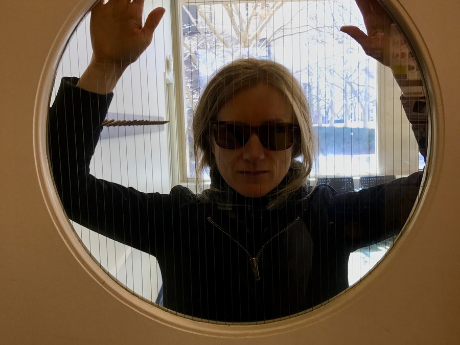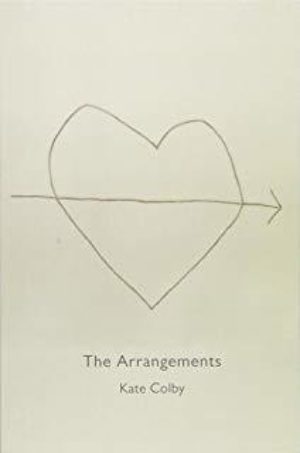In Their Own Words
Kate Colby on “Then-Wife”

Then-Wife
Everything is an omen but doesn't know it,
which is the opposite of the Butterfly Effect
since things don't always have to have happened.
In hindsight, everything is an omen of everything
that comes after it, regardless of cause.
Or regardmore. There, I've coined it.
Everything has been coined at some point—
words and what they stand for. With eyes.
Also, things don't any less have happened
the further in time you get from them—
even memories only ever happened
right now. I was once in a room so hot
and crowded that our sweat condensed
on the ceiling and rained back down.
I think of this every time
I walk beneath a dripping
window unit.
From The Arrangements (Four Way Books, 2018). All rights reserved. Reprinted with the permission of the author.
On "Then-Wife"
"Then-Wife" is one of the first poems I wrote in The Arrangements and it defined some of the book's concerns. At the time I was chronically reading John Berger's And Our Faces, My Heart, Brief as Photos, which I kept close by and regularly opened. Berger's obsession with vision and phenomenology infected me and set me on the path to writing what is now a loose trilogy of books of which The Arrangements is the first. Berger died last year and I will forever be sorry I can't send him my book and tell him how important his own books are to me.
At the moment, I think this poem is about being stifled by subjectivity—trying to explain myself out of it, and then panicking at the possibility of my own impossible self-annihilation—and testing the degree to which language is escapable, which it isn't. Every memory or act of speech or perception is, and is seen through, a "window unit," or mediating frame of time and causality and other constructs that are built into language and codependent with expression.
On the largest scale, this and many of my poems explore philosophical notions about whether and where any kind of objective reality might be available to human perception. More locally, they evince worries about language and memory overwriting, even preempting, individual and collective experience (i.e., "Let me recite what history teaches. History teaches."—Gertrude Stein). A "then-wife" is both wedded to the past and forever provisional. But here I was finding a little hope or liberation in the idea that a memory only ever takes place in the present, and that a thing you know is and regard as filtered is pretty close to real.
I like to think of poetry as an anti-positivist treatment of the world, but causality at the atomic level preoccupies me and so I scrutinize the impetuses of my own poems, and they fold in on themselves. There's a line in my last book, I Mean (Ugly Duckling Presse, 2015): "I mean talking about it by talking about talking about it," and I think that's my M.O., peeling off the onion layers, working toward a center, which, if were there and/or reachable, would consist of onion.



